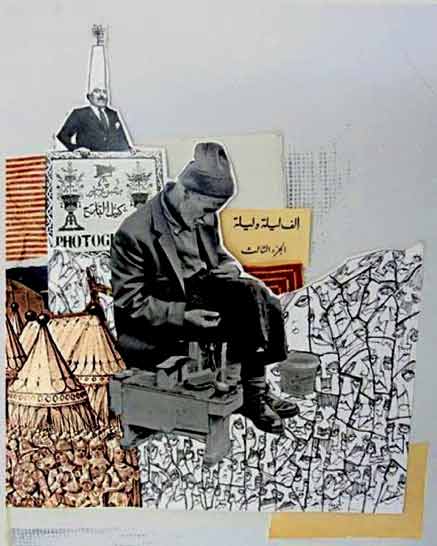 |
| Nidal |
|
|
Nidel El-Khairy |
After completing a Bachelor’s in Fine Arts in Massachusetts, Nidal El-Khairy moved to Montreal, Canada where he spent four and a half years. In 2006, he moved back to Amman, where his family eventually settled after being displaced during the 1948 Nakba - the expulsion of 750,000 Palestinians during the formation of the Israeli state.
His art practice is based in disciplines and techniques such as drawing, stencil, illustration, comics and muralism. His work has been featured in art spaces and websites such as Electronic Intifada, in newspapers such as Al Akhbar and Ak Safeer in Lebanon, as well as on a Noam Chomsky book cover. He has participated in group shows such as Artists Against the Israeli Occupation, in both Montreal and Tokyo.
Nidal is currently in Caracas to show his work at the Rómulo Gallegos Center for Latin American Studies; the exhibition opens on Wednesday May 12, at 7pm. He will also be participating in the first Venezuelan Urban Intervention Festival to be held at the end of the month.
Occasion for which our editorial met up with Nidal and asked him a few questions.
On Art and Information
A few years ago, you mentioned that you have always wanted to explore animation and merge your artwork with the documentary form.This is the quote from an interview you did in 2008:
“I've always wanted to animate and merge cartoons with documentaries. We live in a world where visual bombardment is a part of our everyday life. It distracts us from focusing on our problems as a people... so in my opinion if we want to talk about social justice we should enter these new digital arenas.”
Are you still planning to work on this kind of project?
Animation is something I've been talking about for the past 3 years, it's not happening yet but I am in the process of learning the different techniques necessary to make it happen.
Do you want to do a documentary because you think that the aesthetic power of art can break the visual bombardment of media information? Or more generally, what was your intention?
I had a discussion with an editor about photography and we agreed that if you continuously represent people's causes through photography eventually people get used to seeing someone suffer, in a photograph. In Canada, in corner stores and supermarkets, you commonly see a picture of a starving Somali kid next to the counter. So much so that it becomes what you understand of a Somali kid or perhaps of any African kid. It becomes the "norm" - that skinny and starving is what an African kid looks like. The brain functions in a similar way when one sees Palestinians being bombed, it doesn't affect us, there is no news there. This is how we are being desensitized about human tragedies - that most often happen in "faraway places".
Another example is Iraq, where the death tolls have become numbers. As much as you are in solidarity with Iraq, against the occupation, against the war in Iraq, you just read it everyday in a newspaper, or see the bombardments in photographs – and people dying are just numbers. The information is there but sterilized of any emotions. I think that art has something else to offer if it can engage in media information. The aesthetic power of art can revert the abstract information conveyed by the media.
So, you think that artists should get involved in media information?
Yes, it is something that I would like to see more of. The media is already prejudiced, in the Western world at least. Al Jazeera was a new phenomenon for us, and it kind of reported, but eventually it sometimes becomes just news, that abstract news. I think that artists should participate more in media, or alternative media, or even try to infiltrate the mainstream. For example Al Jazeera has a film festival which is broadcasted on television, on the documentary channel. I think it's important for artists – socially conscious artists – to try to present their work at this level because the exposure is very high and as much as we love and support alternative media, I think this is an arena that should be used as well, you should put your foot in any door that you can at this point. Also, using the Internet is important, things spread like wildfire on the web.
Why aren't artists doing that? Do you think that they are too concerned with their careers or making it in the "art world" that they just don't engage in real issues?
Definitely. There is a lack of workshops and organizing around building this awareness. There are a lot of artists doing art for art's sake and there is an agenda behind that, to support this kind of "no-message" art. So the first step is to build collectives of artists who want to talk about social justice and imperialism, there needs to be some sort of organizing with these artists and dialogue between them.
There should be more of a do-it-yourself attitude in the artscene, so as to not get sucked into established mechanisms.
Venezuela’s Outspoken Position on the Palestinian Issue
These outspoken policies include being one of the first countries to condemn the bombing in Gaza on an international level and kicking the Israeli ambassador out of the country, doing the same the year before when Israel attacked Lebanon. Also, after seeing the Venezuelan food trucks being rejected at the borders, Hugo Chavez said he would go into Gaza with George Galloway, the British MP; in general Venezuela is openly critical and does not play the diplomacy role, also, Venezuela has a Palestinian diplomatic representation in the country, not Israeli- actually, for all Israeli issues the Canadian embassy represents Israel in Venezuela.
Is Venezuela taking the right direction with its position?
I think it's a given for me to say yes! As Arabs have failed miserably with that, this position that Venezuela has taken has left a mark. I think people admire it in the Arab world. One year and half ago, during the Gaza war, right after Venezuela kicked-out the Israeli ambassador, I went to look for the biggest Venezuelan flag I could find. It was supposed to go to the Embassy, but I told the tailor that I wanted it and I got it. I took it to a large demonstration and there was a young activist that saw me with the flag and started yelling at me, saying that we had agreed to only have Jordanian and Palestinian flags in this march. After he said this I think he put his life in danger, people wanted to literally kick his ass for trying to put down the Venezuelan flag. People respect an anti-imperial stance, we are dying for it on a political level, so when we see something like that...
What? Venezuela was the only foreign flag, besides the Jordanian and Palestinian flags?
Yes, it was... what other flag would we raise?
There are no other countries in the Arab world, or in the region, that have a stance similar to Venezuela?
Similar yes… maybe Syria, Iran; they are anti-imperialist despite of their internal policy… which I don't agree with, but the question that raises itself is why so few?
I think it’s the influence of imperialism in the region. Since Israel is an extension of European colonialism and modern US imperialism, many regimes in the region wouldn't dare kick out Israeli Ambassadors and cut all sorts of political and economic relations with Israel, simply because they are client regimes of imperialism that don't look for the best interest of their people, but rather their own pockets. They are complicit with the colonial apartheid Zionist entity (Israel). In a certain way the whole Arab world is infected by the old imperial strategy: to divide us in order to eventually subjugate us.
A brainwash?
Yes, to start pointing fingers at Iran for example and totally forget about Israel. At one point, the Saudis, Israel and Egypt were in the same camp. Saudi Arabia and Israel did not sign any sort of agreement, officially, but they were on the same side concerning Iran, which is a horrible thing, to forget about your regional oppressor. Israel affects the whole region, not only Palestine - through their political threats, through economics, and through everything. So yes, there is an ongoing manipulation and at this moment the focus is against Iran. In relation to this, a filmmaker from the BBC said word-for-word that if you go to European producers to pitch a story and talk against Iran, they will fund you immediately, so unfortunately many are falling into this. So no, there wasn't any Iranian flag or any other flag!
Amazing. But, isn't the Venezuelan position a bit too harsh?
Too harsh?
The opposition here in Venezuela and the international media has said that. It's a very direct stance, Venezuela is openly saying things that other countries do not dare to say publicly; in a certain way it is considered "slightly undiplomatic".
Yes, but didn't people say the same thing when the world started to boycott apartheid in South Africa? Israel was a country that never boycotted the apartheid because it has the same system, they were allies, and the United States as well. Usually the person who takes the first step gets the finger pointed at and is labeled as too harsh. Hopefully down the road, through boycott, divestment, sanctions and awareness campaigns, it will become the right thing to do, and people will follow.
Here is a taste of Nidal El-Khairy's concept of "Art as Media Information"
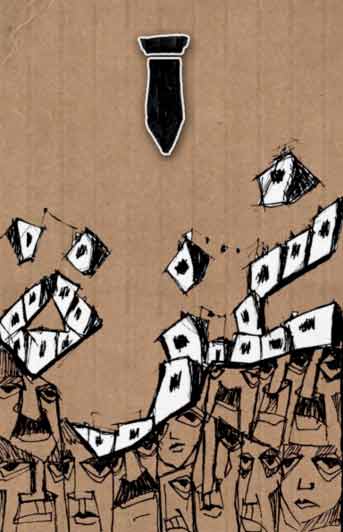 |
| Bomba |
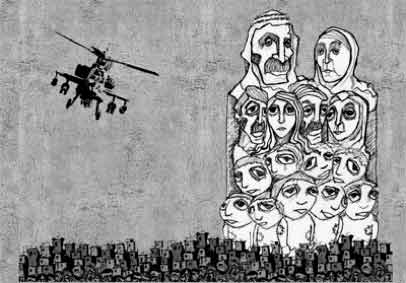 |
| Mar7Aban |
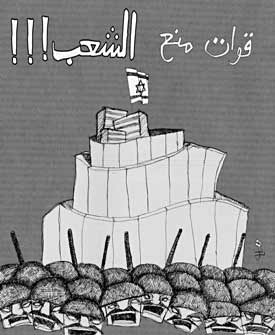 |
| Amman, Jordan |
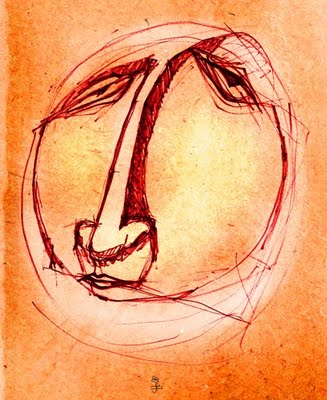 |
| Hajjeh |
 |
| Television |
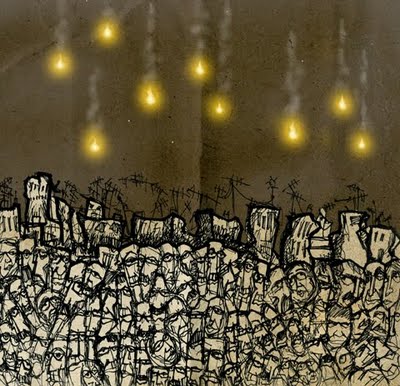 |
| ٍSabra and Shatila massacre 1982 |
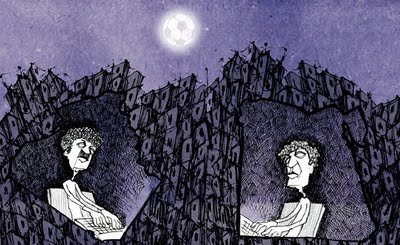 |
| Final Moon |
Go to Nidal El-Khairy's website to see much more.
Exhibition:
As a part of the 2nd Cultural-Academic Event: Palestine, Eleven Thousand Years of History. Opening on Wednesday, May 12, 7pm, Celarg, Sala NG how to get there
Intervention:
As part of the 1st Urban Intervention Festival of La Pastora (neighbourhood in downtown Caracas)
To be held from May 25 to 29 information (in Spanish)
Spanish translation of the interview
Corneta is a non-profit, artist-run project based in Caracas, Venezuela. Every issue of the cultural weekly (corneta.org) features an artist or collective, as well as alternative news in art, politics and society. Click here to see images of Nidal El-Khairy's work.
Source: Corneta

